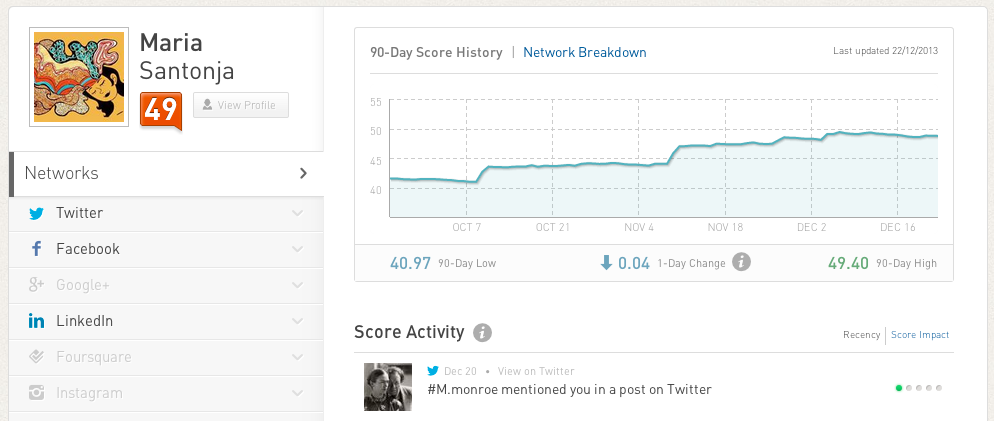Written by María Santoja
Monitoring and tracking what is said about us online is the task that closes the circle of our online reputation strategy work. Monitoring is essential, whether we are a company or whether we are working on our personal brand.
We can’t just launch our messages, we have to check how they are being received, if our strategy is working, or if on the contrary we should change course. There are several tools that can help us discover what is being said about us on the Internet.
Tools to monitor your brand
- This Google tool allows us to set up alerts with our name so that we do not miss anything that is said on the web about us.
- It is convenient to register several alerts to have more control, for example our name, our email, our domain and so on.
- We can define the frequency with which we want to receive the alerts: when they occur, daily, weekly,…
- It is another alert tool, similar to Google Alerts.
- Its control panel is very convenient and intuitive: it allows you to configure several alerts, and specify whether we want them to be in a specific language, or in a specific social network, which allows us to fine-tune the search.
- In addition, Mention works in real time, and offers statistics and analytics to track the evolution of our personal brand.
- The great advantage of this tool is that it gives us real-time information about what is being said about us on the Internet, especially on social networks.
- Use 4 parameters to measure influence: the Forcebased on the number of mentions in 24h; the Feelingwhether negative, positive or neutral mentions are concerned; the Passionwhich allows us to assess the likelihood that a user who has spoken about the brand will do so again; and lastly, the Scopewhich is the indicator to measure the range of influence.
- It also provides us with a list of the keywords that are usually related to our brand, as well as the users that interact with us the most or the sources of mentions.
Klout
- This tool measures our level of influence based on our online activity, especially through social networks, on the one hand with the information of what is said about us in these, and on the other hand through our own publications and the impact they have.
- Klout is based on a numerical indicator, the influence index . In addition, we can observe the evolution of influence through graphs.
- On the other hand, we can search for influencers based on our profile or location, so it is a good guide to establish professional contacts.
Yasni
- It works like a search engine, but specifically focused on people.
- It offers results organized by different filters: news, videos, publications, personal data (telephone, e-mail)…
- Access is free, but if we register we can control our profile and the results that appear about us.
- It is also possible to perform a reverse search, that is, by keywords, so that we will obtain results with the name of professionals that fit the profile. This can help us to discover and monitor our competitors.
- Yasni also allows the configuration of email alerts.
- This tool offers guidelines to improve the results favorable to the brand and position them in the top positions. Brandyourself is mainly focused on personal branding, but the procedure could be equally applicable to a corporate brand.
- As a free user you can register 3 links. Brandyourself measures the evolution of the Google positions of each link, the page rank and so on.
- If you want more tracking and control over more links, a premium option is also available.
- In addition, Brandyourself gives you the option to know from where in the world your name is being googled, through the IP of the device.
There are many other monitoring tools, some of which are paid. In addition, we cannot leave aside the analytics of our website or blog, from which we can also extract a lot of information.
Active listening: an attitude
The great danger that we can fall into when we work on monitoring our brand is to believe that if we have the tool, we already have data and we can rest assured. Data alone does not tell us anything, we must convert the figures into real knowledge. This is where the concept of active listening comes in.
Active listening is a communication and conflict resolution technique based on the idea that it is not only useful to listen, but also to pay attention to what is being said.
On the Internet we must also apply this maxim, even more so if possible, since we are faced with an oversaturation of information. For all these reasons, let’s take a look at some ideas that should be clear to us when it comes to monitoring our brand:
- First of all, we should not settle for using just one tool to monitor our online reputation, but combine several to get a more general overview.
- Secondly, we should take with caution the “sentiment” variables and the labels for classifying comments as “positive, neutral or negative”. The tools work with algorithms, and no matter how evolved they may be, at the end of the day they are machines that do not have the capacity to interpret something as complex as a feeling. For this reason, we must stop and make an in-depth reading of the comments, interpreting what is being said about us: who wrote the message? what is this person like? what motivated you to leave this comment?
- Finally, we should not limit ourselves to monitoring only our brand and completely forget about our environment. It can be very useful to monitor our competitors, to know what is being said about them and to learn from their successes and failures. But also follow opinion leaders or people we consider to be our target audience.
Social networks are a gold mine for those who know how to read and interpret the messages that users leave on them.
Users, our customers, give us free, real-time feedback on what they love and what they hate. We must be able to collect this information, interpret it and apply it to improve our social media strategy, or better yet, to improve our product.



